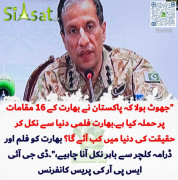I dont agree Dr Israr on this Khilafat thing, in my humble opinion 'Khilafat' is very misguiding term. Can someone explain to me that what you understand by Khilafat? an election/selection system or an administrative system? If it is election/selection system then it is impossible to implement these days, we dont have group of pure people like Sahaba Ikraams and we cannot find them because APP Rasool Allah(PBUH) selected those people. I think Khilafat is an excellent administrative system and best example is Hazrat Umar RA but people are confusing it with election/selection system.. We all will have to be very good muslims so that best of us can work for well being people. This all looks more fairy tail then a practical proposal.
Brother I am writing accroding to my knowledge, Please do not blame others for our own misguidance, May ALLAH show us right Path AMEEN.
It clear that Khilaf is Farz according to this Hadees.
Selecting Khalifa ....
With Abu-Bakr R.A, everybody gave him baiyah (muhajerren and Ansar). So that is out of question. With Omar R.A, it was Abu-Bakr R.A and the consensus of the sahaba and through mashwara if you would call it that they came choose him as a khalifah and ofcourse the baiyah was taken. That is out of question as well. Now with Usman R.A it was consul of 6 who choose him to be the Khalifa. So this is somewhat applicable and closer to our case and the present time. A consul of religious leaders (from different states) can sit and choose a leader based on mutual consent and mashwara. Of course this is my opinion and Allah knows best.
First of all, there are two scenarios that need to be considered here. 1) when the khilafah is already established and a khaleefah dies/steps down/becomes physically impaired etc. and the ummah has to choose the next khaleefah. 2) when there is no khilafah and the first khaleefah has to be appointed (inshaAllah, a reality that is not too far away)
As for the case where the khilafah is already established, we see from the Sunnah and Ijma as-Sahaba that the process of choosing the next khaleefah in the event that the last one dies etc. is through the bayah. this was true in the case of Abu Bakr (RA) where the Sahabah gave bayah in the saqeefah (hall) of banu saida. similarly in the case of Umar (RA) when the ahl hal o aqd gave bayah after the death of Abu Bakr (RA). and it is more evident in the case of Usman (RA) because even though the selection process had been completed after fajr, Shuaib (RA) (the interim amir appointed by Umar (RA) during his last moments) lead the prayers in zuhr. it was after zuhr that the bayah was given to Usman (RA) and then he (RA) lead the asr prayers. and similarly for Ali (RA).
yes, means and styles were different each time, but the process of transferring authority was the same i.e. bayah. when the khilafah is established in the near future the khulafah would strive to perfect these means and styles because that is what islam teaches us; stick firmly to the method (bayah) and keep on improving the means and styles (electoral college, direct nomination etc.)
































